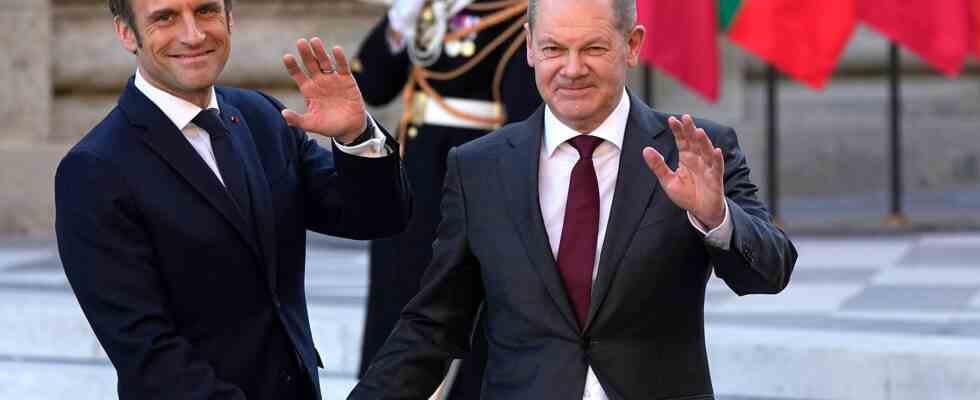Status: 04/25/2022 5:41 p.m
After Macron’s re-election, relief can be felt in German politics. But expectations of Berlin are likely to increase to give more support to Macron’s plans for more European sovereignty.
As Finance Minister under Angela Merkel, Olaf Scholz was not necessarily the best-known German politician in the neighboring country – but those who already knew him in this capacity valued him as a reliable partner. And not only that: it was Scholz who, as Federal Minister of Finance, was willing to make common European debts for the Corona reconstruction fund. This departure from a German position, which was previously perceived as stubborn in France, brought Scholz sympathy and respect in the neighboring country.
In addition, the coalition agreement takes up much of what Macron outlined in his keynote address on European policy at the Sorbonne in 2017 – in particular the idea of greater European sovereignty. Roughly speaking, it is about the EU becoming independent and able to act in central areas – for example in energy supply or digital technology.
In France, people have taken note of this, says Stefan Seidendorf, deputy director of the German-French Institute (DFI) in Ludwigsburg. Nevertheless, the federal government must contribute to symbolically bringing the Franco-German cooperation back to the fore. “There are certainly political approaches in the coalition agreement – but there is still a lack of a symbolic public commitment,” said Seidendorf. “There is still no response to Macron’s Sorbonne speech.”
More communication needed on the subject of Ukraine
Even if the date has not yet been set: Macron’s first trip after his re-election should lead to Berlin, in accordance with diplomatic tradition. The war in Ukraine should also be on the agenda – and the question of arms deliveries. Despite the growing pressure from his own coalition, Scholz has so far hesitated to promise Ukraine the delivery of heavy military equipment such as tanks.
In the neighboring country, Seidendorf says it is understandable that Germany takes fundamentally different positions on security and defense policy than France. In the current debate, however, France has problems understanding the attitude of the German head of government – which is more due to a lack of communication than a lack of understanding of the arguments. “Of course, as a federal government, you can explain very well why you are hesitating about the delivery of heavy weapons. But then you have to come up with arguments and make them public,” said Seidendorf.
So far, France has been very reluctant to comment on the weapons it is supplying to Ukraine. Last Friday, however, Macron explained in a newspaper interview that he would be supplying “Caesar” type howitzers to Ukraine, among other things. Macron and Scholz agree, however, that one should not become a party to the war.
What’s next for joint armaments projects?
When it comes to the question of the future of joint armaments projects in security and defense policy, Macron and Scholz should also have more general topics to talk about. Scholz’s announcement of a “turning point” in German defense policy was positively received in France.
However, the announcement by the federal government in mid-March that it wanted to buy American F35 fighter jets caused resentment in the neighboring country. There they had hoped that the German government would choose the French “Rafale” model as the successor to the aging Tornado.
The German decision had also raised concerns in France about how joint armaments projects that had already been decided on would continue. Discussions are therefore likely to intensify on a topic that is so central to Macron’s vision of a sovereign Europe.
Different positions on key issues
Apart from that, Germany and France still have very different positions on some key issues. These include nuclear power – or economic and fiscal policy. Both countries must work more intensively than before on joint solutions, says Seidendorf.
The coalition agreement does not go far enough on this point – because it is not enough to emphasize that the Stability and Growth Pact has proven its flexibility. “It will be much more difficult and politically much more expensive, but that is what you have to expect from this Franco-German engine: a reform of the Stability and Growth Pact,” said Seidendorf. “On the one hand, this reform must ensure the stability of public budgets and, on the other hand, make the funds available at European level to carry out the major policies of the future.”
The Paris-Berlin axis: still Macron’s “première priorité”?
However, Macron will have to focus more on domestic issues. “This result obliges me,” Macron said in his speech on election night. In the sense that he will have to deal more with the pressing issues of social cohesion. About questions of social balance – and above all the increasing disillusionment of many French people with regard to the political system and its integrative power.
Despite this, Seidendorf does not believe that the Paris-Berlin axis will lose importance as a result. “Macron was the president since Chirac who emphasized most clearly – and also internalized it – that without this Franco-German cooperation in Europe, no political projects are possible.”
In mid-June, however, the next domestic political challenge awaits the president: the parliamentary elections. Then it will be up to Macron to find a parliamentary majority for his ambitious projects.

